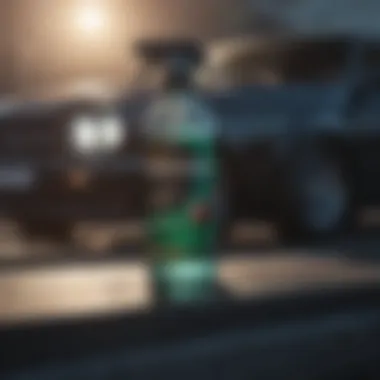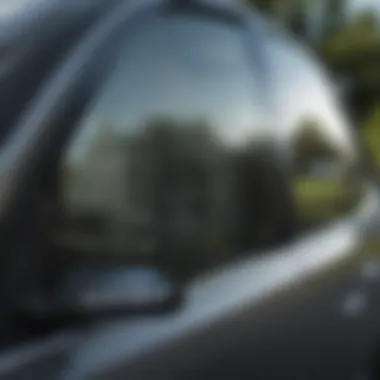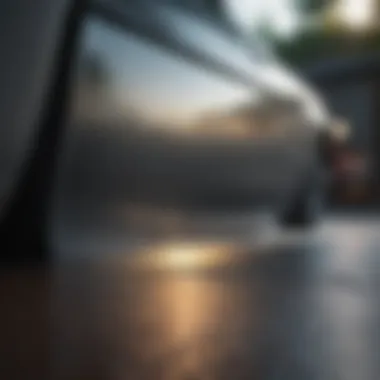Top Glass Cleaners for Tinted Car Windows Reviewed


Intro
Keeping tinted car windows clean is essential for maintaining visibility and preserving the film's integrity. Many car owners overlook the importance of using appropriate cleaning solutions. Without the right products, there is risk of damaging the tint, which can diminish the overall look of the vehicle. This article evaluates various glass cleaners optimized for tinted car windows, detailing their effectiveness and safety. In addition, we will address common mistakes and share expert tips to help consumers achieve outstanding results.
Identifying Key Considerations
When choosing a glass cleaner for tinted windows, a few crucial factors come into play:
- Tint Material: Ensure the cleaner is compatible with the tint film. Not all cleaners are safe.
- Chemical Composition: Some cleaners contain harsh chemicals that can cause harm to the tint.
- Cleaning Effectiveness: A good cleaner should effectively remove grime, fingerprints, and smudges without excessive effort.
- Ease of Use: Convenience in application makes the cleaning task less tiresome.
It's vital to prioritize these key factors when hunting for the most effective cleaner. By doing due diligence, car owners can enjoy a clear view and protect their investments.
Common Mistakes to Avoid
Here are common errors people make when cleaning tinted windows:
- Using ammonia-based cleaners, which can deteriorate tinted film.
- Not following the cleaning instructions on the product label.
- Applying too much cleaner, which can result in streaks.
- Forgetting to check compatibility with window tint before purchasing.
Avoiding these pitfalls ensures that you maintain the cleanliness and longevity of your tinted windows.
Expert Tips for Optimal Results
For best practices during cleaning:
- Utilize a soft, microfiber cloth to gently wipe the surface.
- Spray cleaner onto the cloth rather than directly on the glass to minimize oversaturation.
- Work in small sections for better control and effectiveness.
- Keep the surface vertical and clean frequently for best visibility.
Implementing these suggestions can notably improve the results and presentation of tint film while preserving its lifespan.
Maintaining the quality of tinted windows is not just about aesthetics; it is also vital for driving safety. Clear visibility prevents potential hazards on the road.
Epilogue
Selecting the right glass cleaner for tinted car windows is crucial for protecting the tint and ensuring lasting clarity. As we progress in this article, we will offer insights into various products on the market truly suited for these tasks. By understanding chemical compositions, avoiding common mistakes, and following expert tips, car owners can enhance both performance and appearance.
Foreword to Tinted Windows
Tinted windows in vehicles offer various practical and aesthetic advantages. Understanding these benefits is essential for car owners, especially for those with cars that feature tinted glass. This section delves into the key aspects of tinted windows and sets the stage for discussing the appropriate glass cleaners for maintaining them.
Benefits of Tinted Windows
The appeal of tinted windows goes beyond mere aesthetics. There are several significant benefits to consider:
- UV Protection: Tinted windows block harmful ultraviolet rays, which can lead to skin damage. This part of car safety is often overlooked.
- Heat Reduction: With tinted windows, the interior temperature of the car is often lower. This can enhance comfort during those long drives.
- Privacy: People often seek increased privacy when driving. Tints provide a barrier against prying eyes, which can be an important feature for car owners.
- Glare Reduction: Tinted windows reduce glare from sunlight and headlights, contributing to better driving visibility.
- Enhanced Aesthetics: Many car enthusiasts find that tinted windows improve the overall look of a vehicle. They can lend a sophisticated appearance to both sporty and luxury cars.
Challenges with Tinted Window Care
Even with their numerous advantages, compressed care for tinted windows poses unique challenges that require attention. Increasing awareness about these ongoing issues will allow for better decisions when choosing a glass cleaner:
- Cleaning Products: Not every cleaning product is suitable for tinted surfaces. Users need to be careful about screening for appropriate chemical compositions.
- Scratch Risks: Certain fabric materials or abrasive tools can damage the tinted film. It is crucial to choose the right cleaning tools to prevent scratching.
- Deterioration: Extended exposure to harsh chemicals or cleaners can deteriorate tinting films, making the significance of a good glass cleaner evident.
- Streaking and Smudges: The wrong technique or product can result in unsightly smudges. Proper care practices are vital to maintain clear visibility and optics.
Importance of Choosing the Right Glass Cleaner


When it comes to maintaining tinted car windows, selecting an appropriate glass cleaner is paramount. The right cleaner can enhance visibility while ensuring the longevity of the tint. Poor choice, on the other hand, can lead to visible streaks and damage that may require costly repairs or replacements of the tinted film.
Choosing wisely involves understanding the chemical makeup of the cleaner. Tinted windows typically use films that react adversely to harsh ingredients like ammonia. Hence, a compatible cleaner conserves both visibility and the tinted surface.
"Using the right cleaner prevents damage to the tint and keeps your windows looking pristine."
Careful consideration needs to include numerous factors. The texture and application method are crucial too. Some cleaners are designed for efficient spray-and-wipe usage, while others may require more attention during application to avoid soggy results. Thus, detail and foresight in selecting a glass cleaner will pay off directly in clarity and effective maintenance.
Compatibility with Tinted Windows
Compatibility is essential when dealing with tinted windows. Most tints are formulated to withstand various environmental conditions, but the choice of cleaner can undermine their strength.
Using cleaners specifically labeled as safe for tinted windows makes sense. Solutions containing ammonia should be avoided completely. They can decompose the adhesive used in tint applications, leading to peeling and bubbling, which largely negates the benefits of investment in a quality window tint.
On the other hand, products with ammonia-free formulations that also contain gentle components such as vinegar or natural extracts can effectively clean the surface without compromising integrity. Opting for items tested for tinted window compatibility safeguards the investment made in your vehicle's aesthetic and functional characteristics.
Avoiding Damage to Window Film
Ensuring the longevity of window film requires diligence in cleaning. Damage could manifest from improper care—just one harsh clean with an unsuitable product can peel or crack film.
To reduce risks:
- Always read labels. ×Ensure information regarding compatibility is present.
- Avoid abrasive cloths for wiping. Soft microfiber cloths are advisable.
- Repeat cleaning unnecessarily may weaken adhesive, so tasks should be conducted uniformly and with measured frequency.
Employing products specifically created for tinted windows will minimize risk extensively and bolster window preservation. Sticking to the recommended maintenance practices ensures tinted windows beautification while preventing avoidable failures in window film directly related to improper care. A clear vision through pristine tinted windows prohibits interference with safety for exhilarating drives.
Key Features of Effective Glass Cleaners
Understanding the offerings of glass cleaners suited for tinted car windows is vital for upholding both clarity and the integrity of the tinting material. Certain attributes can separate an effective cleaner from mediocre options. Acknowledging these key features transforms car maintenance from a mundane tedious task into a more careful applicative art. Not every solution available is adequate or safe; therefore, as we explore this category, focus will be aimed at the core strengths and potential downsides in product alternatives.
Chemical Composition
The chemical formulation of a glass cleaner directly impacts its effectiveness on tinted surfaces. Typical glass cleaners often contain aggressive solvents, which can impair or totally damage certain tint films. Hence, it becomes necessary to explore formulations explicitly sold as compatible with tinted windows.
Effective glass cleaners tend to use water as their primary solvent. They may also include specific surfactants that lift dirt, grime, and fingerprints without interacting harmfully with tint films. Some may contain safe pH-balanced elements. Always scan labels for modifiers like ammonia or bleach. Consumer reports frequently point out that cleaners rich with these chemical components should be avoided, as they can strip the protective layers of tint.
It’s beneficial to prioritize those with eco-friendly ingredients, not just for the sake of the environment but also due to reduced harm produced –given both the user’s health and the longevity of the tinted films.
Non-Abrasive Formulas
When selecting a glass cleaner for tinted car windows, non-abrasive formulas are essential. Products determined as abrasive can scratch or harm the tint, resulting in unnecessary costs and inconveniences. Non-abrasive cleaners often feature gentle additives that effectively clean without scratching the tinted surface.
A truly quality cleaner will boast compatible formulations that enable the gentle yet thorough elimination of dirt, dust, and other surface contaminants.
Textured cloths and improper application can also compromise a product's effectiveness. Pairing a high-quality glass cleaner with non-abrasive application tools, such as microfibre cloths, guarantees better results. Cleaning without causing any micro-scratches extends the lifespan of tinted windows while upholding their aesthetic property. Take heed and reflect thoroughly on any instance of micro-abrasive ingredients in product formulations that tout glorified claims but miss the mark on safety.
A proper glass cleaner extends the lifespan of the tinted film, ensuring clarity and protection. Always check both the cleaning agent and tools.
Top Glass Cleaners for Tinted Car Windows
Selecting the right glass cleaner for tinted car windows is essential for both visibility and maintaining the integrity of the window film. The importance of this topic lies in the specific needs of tinted windows, which differ from regular glass. To ensure optimal results, the chosen cleaner must effectively remove dirt, oils, and grime without harming the delicate film that enhances privacy and protects against UV rays.


Product Reviews
Overview
Understanding the available products plays a significant role in making a well-informed choice. In the context of glass cleaners for tinted windows, key options often include well-regarded brands such as Rain-X, Chemical Guys, and Stoner. Each cleaner has been designed with tinted surfaces in mind. A standout characteristic of products like Rain-X's window cleaner is its ammonia-free formula. This feature prevents damage commonly associated with an ammonia base.
The unique composition of Rain-X offers excellent cleaning power while ensuring compatibility with tinted glass. Many car owners appreciate this product for its ease of application. However, some users might notice it leaves a residual feel that could require extra wiping to clear.
Pros and Cons
Analyzing the pros and cons helps individuals select cleaners that fit their requirements. Key advantages of a cleaner like Stoner Invisible Glass include its impressive streak-free finish, making windows look pristine and clear. Customers report fewer instances of fogging after application.
On the other hand, one potential drawback is the cost, which can be higher compared to some less effective products in the market. Knowing both benefits and disadvantages allows consumers to weigh options effectively.
User Feedback
User feedback provides insights that go beyond product claims. Chemical Guys, for instance, regularly earns praise for its glass cleaner's versatility. Many find it not only suitable for windows but also beneficial on interior surfaces without streaking.
Feedback often highlights that this product has quick-drying properties that many appreciate. However, some users mention the scent being a bit strong, which could be a consideration, especially for those sensitive to fragrances. Such user experiences are invaluable for determining potential fits for one's own needs.
Comparison of Leading Brands
When comparing leading brands, it becomes clear that several features influence choice. Key factors include formula safety, price competitiveness, and overall effectiveness.
- Chemical Guys: Known for versatility and a slick finish on multiple surfaces.
- Rain-X: Renowned for ammonia-free cleaning options, protecting the integrity of window tints.
- Stoner Invisible Glass: Famed for its streakless finish but often shadowed by price points.
Making a price vs. effectiveness chart can help prospective buyers weigh their options. Finding the right balance in this comparison ensures consumers pick the cleaner that best aligns with their individual needs, reflecting safety and performance.
How to Properly Clean Tinted Windows
Cleaning tinted car windows requires a considerate approach that involves understanding the materials used in the films and the products suitable for their care. Many drivers may overlook this topic initially, however, using the appropriate cleaners is essential for maintaining the tinted finish while ensuring visibility remains adequate. The method in which you clean these windows directly influences their longevity and performance.
Step-by-Step Guide
- Gather Supplies: Begin with necessary items such as a soft microfiber cloth, a squirt bottle, and a designated glass cleaner meaning it is safe for tinted surfaces. Avoid using ammonia-based liquids because they may degrade the film.
- Prepare the Cleaning Solution: If using a store-bought cleaner, ensure that it has clear labels indicating it is safe for spatial film. Otherwise, one can mix equal parts of water and vinegar as a gentle alternative.
- Initial Rinse: Before applying the cleaner, rinsing the window can help remove loose dirt and debris. This preparation step is often neglected, leading to potential scratches during the wiping process.
- Apply Cleaning Solution: If using a spray bottle, lightly mist the solution onto the window while avoiding excessive overspray that dampens any internal surfaces
- Wipe Gently: Using a clean microfiber cloth, gently wipe away dirt using straight-line motions. Circular motions might create streaks and make it difficult to achieve a crystal-clear finish.
- Dry the Window: Ensure proper drying of the window with a second dry microfiber cloth. This final step is necessary to prevent water spots.
- Inspection: After cleaning, inspect the results carefully. Any remaining streaks can be addressed by re-wiping gently with a dry cloth to achieve clarity.
Best Practices
To keep tinted windows in optimal condition, practice the following:
- Schedule Routine Cleanings: Aim for regular cleanings to prevent dirt buildup. Consider using a protective solution designed for car windows periodically.
- Choose the Right Time: Clean windows on a cloudy day or in a shaded area to avoid the direct sun drying the cleaner too quickly, making it harder to remove stains during the clean process.
- Be Mindful of Tools: Select soft and non-abrasive materials. This precaution helps reduce the chances of scratched surfaces.
Avoid harsh sponges and bristles. These can permanently damage the tinted film.
- Stay Consistent with Products: Avoid switching cleaning agents often. Find what works best and stick with it to ensure that the window film remains stable.
Following these guidelines will strengthen better care for your tinted windows while ensuring enhanced visibility. Proper tint maintenance leads to better aesthetics and maximum performance over time.
Common Mistakes When Cleaning Tinted Windows
Cleaning tinted windows requires specific awareness to ensure that the integrity of the film remains intact. Mistakes in this process can not only hinder visibility but may also lead to costly damage. Understanding common errors when cleaning tinted windows is essential for preserving both function and aesthetic appeal.


Using Harsh Chemicals
One of the most frequent blunders is the use of harsh chemicals. Products containing ammonia, bleach, or aggressive detergents can degrade the tint over time. Instead of enhancing clarity, these substances interfere with the film, leading to fading, bubbling, or even peeling.
When selecting a glass cleaner, paying close attention to the chemical composition is crucial. Many cleaners derive their effectiveness from safe, non-toxic ingredients. For instance, opt for formulas labeled as
Expert Tips for Maintaining Tinted Windows
Maintaining tinted windows is essential not only for aesthetics, but also for ensuring visibility and safety. Proper care allows the window film to serve its purpose without deteriorating too soon. Neglecting to maintain tinted windows can lead to peeling, bubble formation, and noticeable fading.
Investing in the right products and methods enriches the driving experience. With deeper knowledge, car owners can prolong the life of their tinted windows and maintain their performance. In this section, we will explore routine maintenance suggestions and ways to avoid environmental damage to tinted windows.
Routine Maintenance Suggestions
Regular cleaning is crucial to preserving the integrity of tinted windows. Here are effective maintenance strategies:
- Clean Monthly: Dust and debris can accumulate on the tinted surface. Cleaning the windows once a month helps mitigate build-up.
- Use Compatible Cleaners: Select glass cleaners explicitly labeled as safe for tinted windows. Products formulated with a neutral pH will assist in the upkeep without harming the tint.
- Microfiber Cloths: Utilize non-abrasive microfiber cloths to clean tinted windows. These cloths minimize the risk of scratches while providing a streak-free finish.
- Gentle Techniques: Avoid vigorous scrubbing. Instead, use light circular motions to remove grime without applying excessive pressure.
- Stay Hydrated: If you plan on exposing your car to extreme sun for long time, keep tinted windows hydrated. Applying a protectant can extend film life.
To emphasize, taking the time to regularly care for your tinted windows can save money in the long run by preventing expensive repairs or replacements.
Avoiding Environmental Damage
Tinted windows face various environmental conditions which could potentially damage them over time. Learning how to protect them is key. Consider the following tips:
- Avoid Sun Exposure: Park in shaded areas when possible to protect the tint from UV rays. Prolonged exposure could lead to fading and degradation.
- Temperature Extremes: Dramatic temperature changes can weaken the adhesive properties of the film. Try to park in garages or use windshield screens to help ward off extreme temperatures.
- Precipitation Protection: Rain or compounds from the environment should not be ignored. Ideally, clean tinted windows after heavy rainfall to avoid contaminants sitting on the surface.
- Natural Sprays: Before windy weather happens, a light coat of glass cleaner can create a barrier for contaminants and reduce environmental impact on the tint.
Regular preventive measures significantly extend the life of window films.
Establishing a consistent routine will undoubtedly keep tinted windows looking appealing and performing at their best in various conditions. By implementing these expert tips, one can feel confident that their tinted windows will not only maintain their visual appeal but also extend their useful life.
Long-term Care for Tinted Windows
Long-term care for tinted windows is essential to maintaining both their appearance and functionality. Proper care not only extends the lifespan of the window film but also ensures optimal visibility for drivers and passengers. Neglect can lead to fading, bubbling, or peeling, which undermines the investments made in tinting and can impair driving safety. Therefore, understanding effective maintenance is crucial.
Store-Bought Solutions vs.
DIY Alternatives
When addressing the care of tinted windows, one can choose between store-bought solutions or DIY alternatives. Store-bought glass cleaners specifically designed for tinted windows often contain formulated chemicals that effectively clean without causing harm. Brands like Invisible Glass and Zep offer products known for their gentle yet effective cleaning properties.
On the other hand, DIY cleansers are often regarded as cost-effective alternatives. Common household solutions usually include water-based mixtures and ingredients like vinegar. However, caution is advised, as not all substances are safe for window films. For instance, ammonia-based cleaners can deteriorate the film over time. Thus, while DIY can save money, ensuring the right ingredients is vital for preserving the integrity of tint films. It is wise to check product labels carefully, regardless of the direction chosen.
Understanding Tinted Film Durability
Tinted film durability largely influences the long-term maintenance routines that one must adopt. Different brands and types of tint have various life expectancies, typically ranging from five to fifteen years. The rate of degradation often depends on factors such as climate exposure, usage patterns, and maintenance strategies.
Tint films can be vulnerable to environmental factors. UV rays can weaken the bonds within the film, and abrasive cleaning can scratch the surface. Understanding the performance expectations of your specific film is critical. Most tints themselves come with manufacturer guidelines that detail their care. By following those suggestions, you significantly enhance their lifespan.
Culmination
Choosing the right glass cleaner for tinted windows is vital in maintaining both clarity and the integrity of the films. In this article, we discuss key factors that affect how products perform with tinted surfaces. The compatibility of the cleaner with window films is some things can’t be overlook. A product that is visually effective for clear glass might be inadequate, or even detrimental, to tinted surfaces.
Understanding chemical compositions comes next. Some chemical compositions might damage the tint over time which is detrementtal, meaning special care should be taken when selecting cleaners. Common issues with improperly chosen cleaners includes discoloration or damage to UV protective layers.
Additionally, we reviewed specific cleaners outstanding for this use. Pros and cons of each were highlighted, as well as direct feedback from users to guide readers. Choosing the best should not only be based on their effectiveness in cleaning but also their safety for the tinted materials.
It's also clear that maintaining tinted car windows goes beyond just periodic cleaning. Understanding the unique properties of window tints and following best practices can extend their lifespan.
Choosing well can mean long term benefits, while in a contrasting scenario, poor selections might lead to costly repairs or time wasted in proper restoration. Hence, these factors concisively state how essential the right glass cleaner is. The road ahead will always be clearer and smoother with the right product.







